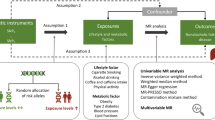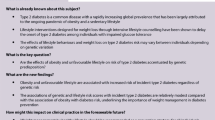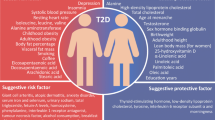Abstract
The objective of this study was to examine the effect of genetic variants in fat mass and obesity associated (FTO) gene on metabolic syndrome (MetS). A systematic literature search was performed and random-effects meta-analysis was used to evaluate genetic variants in FTO with MetS. A gene-based analysis was conducted to investigate the cumulative effects of genetic polymorphisms in FTO. A total of 18 studies from 13 published papers were included in our analysis. Random-effects meta-analysis yielded an estimated odds ratio of 1.19 (95% CI 1.12–1.27; P = 1.38 × 10−7) for rs9939609, 1.19 (95% CI 1.05–1.35; P = 0.008) for rs8050136, and 1.89 (95% CI 1.20–2.96; P = 0.006) for rs1421085. The gene-based analysis indicated that FTO is strongly associated with MetS (P < 10−5). This association remains after excluding rs9939609, a SNP that was frequently reported to have strong association with obesity and MetS. In this study, we concluded that the FTO gene may play a critical role in leading to MetS. Targeting this gene may provide novel therapeutic strategies for the prevention and treatment of metabolic syndrome.



Similar content being viewed by others
References
Grundy SM, Brewer HB Jr, Cleeman JI et al (2004) Definition of metabolic syndrome: report of the National Heart, Lung, and Blood Institute/American Heart Association Conference on scientific issues related to definition. Arterioscler Thromb Vasc Biol 24:e13–e18
Reaven GM (1988) Banting lecture 1988. Role of insulin resistance in human disease. Diabetes 37:1595–1607
Expert panel on detection, evaluation, and treatment of high blood cholesterol in adults (2001) Executive summary of the third report of the national cholesterol education program (NCEP) expert panel on detection, evaluation, and treatment of high blood cholesterol in adults (adult treatment panel III). JAMA 285:2486–2497
International Diabetes Federation (2006) The IDF consensus worldwide definition of the metabolic syndrome. International Diabetes Federation, Brussels
WHO consultation (1999) Definition, diagnosis and classification of diabetes mellitus and its complications. World Health Organization. World Health Organization, Geneva, pp 31–33
Matsuzawa Y (2005) Metabolic syndrome—definition and diagnostic criteria in Japan. J Atheroscler Thromb 12:301
Grundy SM, Cleeman JI, Daniels SR et al (2005) Diagnosis and management of the metabolic syndrome: an American Heart Association/National Heart, Lung, And Blood Institute Scientific Statement. Circulation 112:2735–2752
Moebus S, Hanisch JU, Neuhauser M et al. (2006) Assessing the prevalence of the metabolic syndrome according to NCEP ATP III in Germany: feasibility and quality aspects of a two step approach in 1550 randomly selected primary health care practices. Ger Med Sci 4:Doc07
Zabaneh D, Balding DJ (2010) A genome-wide association study of the metabolic syndrome in Indian Asian men. PLoS ONE 5:e11961
Pollex RL, Hanley AJ, Zinman B et al (2006) Metabolic syndrome in aboriginal Canadians: prevalence and genetic associations. Atherosclerosis 184:121–129
Fernandez ML, Ruiz R, Gonzalez MA et al (2004) Association of NOS3 gene with metabolic syndrome in hypertensive patients. Thromb Haemost 92:413–418
Guettier JM, Georgopoulos A, Tsai MY et al (2005) Polymorphisms in the fatty acid-binding protein 2 and apolipoprotein C-III genes are associated with the metabolic syndrome and dyslipidemia in a South Indian population. J Clin Endocrinol Metab 90:1705–1711
Hamid YH, Rose CS, Urhammer SA et al (2005) Variations of the interleukin-6 promoter are associated with features of the metabolic syndrome in Caucasian Danes. Diabetologia 48:251–260
Lee YJ, Tsai JC (2002) ACE gene insertion/deletion polymorphism associated with 1998 World Health Organization definition of metabolic syndrome in Chinese type 2 diabetic patients. Diabetes Care 25:1002–1008
Frayling TM, Timpson NJ, Weedon MN et al (2007) A common variant in the FTO gene is associated with body mass index and predisposes to childhood and adult obesity. Science 316:889–894
Gerken T, Girard CA, Tung YC et al (2007) The obesity-associated FTO gene encodes a 2-oxoglutarate-dependent nucleic acid demethylase. Science 318:1469–1472
Karasawa S, Daimon M, Sasaki S et al (2010) Association of the common fat mass and obesity associated (FTO) gene polymorphism with obesity in a Japanese population. Endocr J 57:293–301
Cha SW, Choi SM, Kim KS et al (2008) Replication of genetic effects of FTO polymorphisms on BMI in a Korean population. Obesity 16:2187–2189
Hubacek JA, Bohuslavova R, Kuthanova L et al (2008) The FTO gene and obesity in a large Eastern European population sample: the HAPIEE study. Obesity 16:2764–2766
Ng MC, Park KS, Oh B et al (2008) Implication of genetic variants near TCF7L2, SLC30A8, HHEX, CDKAL1, CDKN2A/B, IGF2BP2, and FTO in type 2 diabetes and obesity in 6, 719 Asians. Diabetes 57:2226–2233
Rong R, Hanson RL, Ortiz D et al (2009) Association analysis of variation in/near FTO, CDKAL1, SLC30A8, HHEX, EXT2, IGF2BP2, LOC387761, and CDKN2B with type 2 diabetes and related quantitative traits in Pima Indians. Diabetes 58:478–488
Wing MR, Ziegler J, Langefeld CD et al (2009) Analysis of FTO gene variants with measures of obesity and glucose homeostasis in the IRAS family study. Hum Genet 125:615–626
Villalobos-Comparan M, Teresa Flores-DorantesM, Teresa Villarreal-MolinaM et al (2008) The FTO gene is associated with adulthood obesity in the Mexican population. Obesity 16:2296–2301
The Wellcome Trust Case Control Consortium (2007) Genome-wide association study of 14,000 cases of seven common diseases and 3,000 shared controls. Nature 447:661–678
Horikoshi M, Hara K, Ito C et al (2007) Variations in the HHEX gene are associated with increased risk of type 2 diabetes in the Japanese population. Diabetologia 50:2461–2466
Cruz M, Valladares-Salgado A, Garcia-Mena J et al (2010) Candidate gene association study conditioning on individual ancestry in patients with type 2 diabetes and metabolic syndrome from Mexico City. Diabetes Metab Res Rev 26:261–270
Sjogren M, Lyssenko V, Jonsson A et al (2008) The search for putative unifying genetic factors for components of the metabolic syndrome. Diabetologia 51:2242–2251
Attaoua R, Ait El Mkadem S, Radian S et al (2008) FTO gene associates to metabolic syndrome in women with polycystic ovary syndrome. Biochem Biophys Res Commun 373:230–234
Al-Attar SA, Pollex RL, Ban MR et al (2008) Association between the FTO rs9939609 polymorphism and the metabolic syndrome in a non-Caucasian multi-ethnic sample. Cardiovasc Diabetol 7:5
Hotta K, Kitamoto T, Kitamoto A et al (2011) Association of variations in the FTO, SCG3 and MTMR9 genes with metabolic syndrome in a Japanese population. J Hum Genet 59(6):647–651
Liem ET, Vonk JM, Sauer PJ et al (2010) Influence of common variants near INSIG2, in FTO, and near MC4R genes on overweight and the metabolic profile in adolescence: the TRAILS (TRacking adolescents’ individual lives survey) study. Am J Clin Nutr 91:321–328
Zeggini E, Weedon MN, Lindgren CM et al (2007) Replication of genome-wide association signals in UK samples reveals risk loci for type 2 diabetes. Science 316:1336–1341
Wang T, Huang Y, Xiao XH et al (2010) The association between common genetic variation in the FTO gene and metabolic syndrome in Han Chinese. Chin Med J (Engl) 123:1852–1858
Freathy RM, Timpson NJ, Lawlor DA et al (2008) Common variation in the FTO gene alters diabetes-related metabolic traits to the extent expected given its effect on BMI. Diabetes 57:1419–1426
Cheung CY, Tso AW, Cheung BM et al (2011) Genetic variants associated with persistent central obesity and the metabolic syndrome in a 12 year longitudinal study. Eur J Endocrinol 164:381–388
Steemburgo T, de Azevedo MJ, Gross JL et al. (2011) The rs7204609 polymorphism in the fat mass and obesity-associated gene is positively associated with central obesity and micro albuminuria in patients with type 2 diabetes from Southern Brazil. J Ren Nutr
Ranjith N, Pegoraro RJ, Shanmugam R (2011) Obesity-associated genetic variants in young Asian Indians with the metabolic syndrome and myocardial infarction. Cardiovasc J Afr 22:25–30
Egger M, Davey Smith G, Schneider M et al (1997) Bias in meta-analysis detected by a simple, graphical test. BMJ 315:629–634
Fisher RA (1932) Statistical methods for research workers, 4th edn. Oliver and Boyd, Edinburgh, pp xiii p., 1 l
Simes RJ (1986) An improved bonferroni procedure for multiple tests of significance. Biometrika 73:751–754
Hartung J (1999) A note on combining dependent tests of significance. Biom J 41:849–855
Zaykin DV, Zhivotovsky LA, Westfall PH et al (2002) Truncated product method for combining P values. Genet Epidemiol 22:170–185
Attaoua R, Ait El Mkadem S, Lautier C et al (2009) Association of the FTO gene with obesity and the metabolic syndrome is independent of the IRS-2 gene in the female population of Southern France. Diabetes Metab 35:476–483
Ahmad T, Chasman DI, Mora S et al (2010) The fat-mass and obesity-associated (FTO) gene, physical activity, and risk of incident cardiovascular events in white women. Am Heart J 160:1163–1169
Hotta K, Nakata Y, Matsuo T et al (2008) Variations in the FTO gene are associated with severe obesity in the Japanese. J Hum Genet 53:546–553
Song Y, You NC, Hsu YH et al (2008) FTO polymorphisms are associated with obesity but not diabetes risk in postmenopausal women. Obesity 16:2472–2480
Tan GD, Neville MJ, Liverani E et al (2006) The in vivo effects of the Pro12Ala PPARgamma2 polymorphism on adipose tissue NEFA metabolism: the first use of the Oxford Biobank. Diabetologia 49:158–168
Ferrucci L, Bandinelli S, Benvenuti E et al (2000) Subsystems contributing to the decline in ability to walk: bridging the gap between epidemiology and geriatric practice in the InCHIANTI study. J Am Geriatr Soc 48:1618–1625
Lesnick TG, Papapetropoulos S, Mash DC et al (2007) A genomic pathway approach to a complex disease: axon guidance and Parkinson disease. PLoS Genet 3:e98
Peng G, Luo L, Siu H et al (2010) Gene and pathway-based second-wave analysis of genome-wide association studies. Eur J Hum Genet 18:111–117
Acknowledgments
This study was supported by the Independent Innovation Foundation of Shandong University (No. 2010TS071). The project described was supported by Award Number P50DA010075-15 from the National Institute on Drug Abuse. The content is solely the responsibility of the authors and does not necessarily represent the official views of the National Institute on Drug Abuse or the National Institutes of Health.
Author information
Authors and Affiliations
Corresponding author
Electronic supplementary material
Below is the link to the electronic supplementary material.
Rights and permissions
About this article
Cite this article
Wang, H., Dong, S., Xu, H. et al. Genetic variants in FTO associated with metabolic syndrome: a meta- and gene-based analysis. Mol Biol Rep 39, 5691–5698 (2012). https://doi.org/10.1007/s11033-011-1377-y
Received:
Accepted:
Published:
Issue Date:
DOI: https://doi.org/10.1007/s11033-011-1377-y




